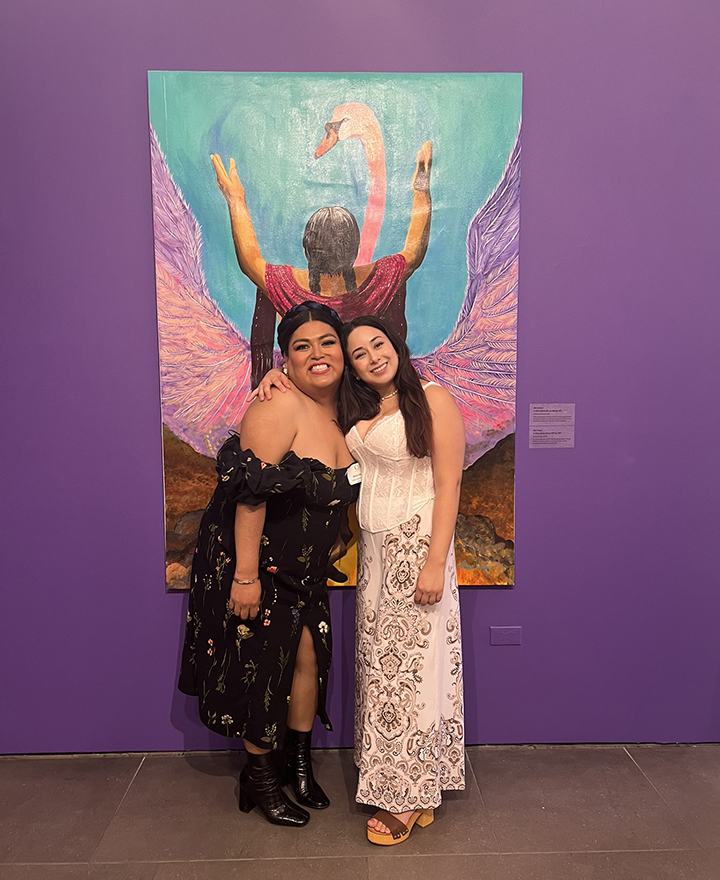Maria Liliana Ramirez’s journey in art and academia

Maria Liliana Ramirez’s journey in art and academia
- June 17, 2024
- ’24 anthropology Ph.D. will be starting a two-year post-grad fellowship with the Justice Action Center in September
 Newly minted UCI anthropology Ph.D. Maria Liliana Ramirez has recently received a
Leading Edge Postdoctoral Fellowship from the American Council of Learned Societies
(ACLS). She has been hired as a social scientist by the Justice Action Center (JAC),
a legal advocacy organization focused on immigration.
Newly minted UCI anthropology Ph.D. Maria Liliana Ramirez has recently received a
Leading Edge Postdoctoral Fellowship from the American Council of Learned Societies
(ACLS). She has been hired as a social scientist by the Justice Action Center (JAC),
a legal advocacy organization focused on immigration.
“The ACLS program is a fantastic opportunity to get academics working outside academia,” says associate professor of anthropology Keith M. Murphy, who serves as Ramirez’s dissertation advisor.
Another factor that sets Ramirez apart is that she has also curated an exhibit on view at the Oceanside Museum of Art. The exhibit, titled Undocumented Time/Queer Yearnings, features the work of Alexa Vasquez, an undocumented trans woman, whose multidisciplinary work reflects her double marginalized life.
“Lili is really putting her research into practice in an interesting way,” says Murphy. “She is iconic. She’s now my model of what commitment and hard work can achieve.”
Intersecting narratives
Ramirez’s dissertation focuses on art and art practice among undocumented people in the U.S. and Mexico. When she arrived at UCI, she knew she wanted to focus her research on undocumented issues and found herself gravitating toward undocumented artists that she discovered on social media.
“I noticed that undocumented artists were having conversations that weren’t being held in academia or in the media,” Ramirez says.
She discovered that art created by undocumented artists often serves to navigate and cope with the violence and challenges associated with being undocumented.
“Art not only mobilizes but becomes a way for people to reclaim their humanity and to imagine a world in which violence doesn’t exist,” Ramirez says. “Through art, people can acknowledge the hard times, while also moving beyond it.”
Ramirez, who herself is undocumented, can bring a particular perspective to the work. At first, she believed that focusing on art would create a distance between her research and her own story. But she couldn’t ignore how her personal narrative intersected with wider cultural, political, and social issues. As a result, her work drifted toward auto-ethnographic accounts of her own immigration experience.
“This led to an incredible opening up of the topic that produced something truly beautiful,” says Murphy.
Resilient roots
At four years old, Ramirez crossed the U.S.-Mexico border at San Ysidro with her mother. She settled with her family in El Monte, CA, a predominantly immigrant community in the San Gabriel Valley.
“At the beginning, my interest in pursuing research was about trying to understand my personal experience and the social and political context that resulted in my family arriving in the United States,” she says.
As an undocumented student, Ramirez was aware that pursuing higher education would be challenging, but this awareness only strengthened her resolve. Plus, knowing that her parents lacked the opportunity to further their own education made her value it even more.
Luckily, by the time Ramirez graduated from high school, the Deferred Action for Childhood Arrivals (DACA) and the California Dream Act had passed. These pieces of legislation provided her with access to financial aid and work permits, which allowed her to start her academic journey at a community college before transferring to UC Riverside. There, she joined a program designed to help undergraduate students from underrepresented backgrounds conduct research and prepare for graduate school. This experience convinced her to pursue a Ph.D.
Adapting and thriving
Ramirez’s status influenced her decision on where to apply to graduate school. In 2016, after the presidential election results came in, she chose to abandon her out-of-state applications.
“At the time, it felt very important to stay close to family and to live in a state that had undocumented-friendly policies,” she says.
After limiting her applications to California, Ramirez was attracted to UCI’s interdisciplinary anthropology program and its exceptional faculty. Experiencing the program firsthand confirmed her choice. Alongside Murphy, who has been a key mentor and advisor, Ramirez was also inspired by former UCI assistant professor of anthropology Sylvia Nam.
“It was meaningful to see someone who also grew up in an immigrant home succeed in academia,” she says.
Ramirez also credits the community she formed while at UCI with helping her navigate graduate school. She found particular solace among fellow undocumented graduate students who encouraged her to reflect on her values as she prepares to move forward in her career.
“Knowing why you're doing your research helps shine a light on your goals,” she says.
Ramirez was among the cohort of graduate students most severely impacted by the Covid-19 pandemic. She was preparing to begin her long-term ethnographic research when the world locked down. Having a support network was essential during those difficult times.
Despite the setback, Ramirez managed to find ways to start her fieldwork. She expanded her questions and network of people. As the world began to open again, she discovered new forms of engagement, like working on the curatorial side of the art world.
A bright future
In September, Ramirez will begin her two-year postdoctoral fellowship as a narrative research specialist with the JAC. She will conduct ethnographic research to support JAC’s legal and communications teams. In this role, she will travel to Tijuana and various refugee camps and centers to interview immigrants and refugees.
For the long-term, Ramirez hopes to publish her dissertation as a book and continue researching and drawing attention to immigrant stories of underrepresented people.
Wherever she ends up, Murphy has faith in Ramirez’s future. “I’ve been fortunate enough to watch Lili transform into a brilliant and always compassionate scholar, who will,” he says, “without a doubt, make this world better.”
-Jill Kato for UCI School of Social Sciences
-pictured top to right: Maria Liliana Ramirez. Ramirez (right) with Alexa Vasquez
at the opening celebration of the exhibition Undocumented Times/Queer Yearnings at
the Oceanside Museum of Art on June 8, 2024. They are standing in front of la ultima
ofrenda (the last offering).
-----
Would you like to get more involved with the social sciences? Email us at communications@socsci.uci.edu to connect.
Share on:


connect with us: